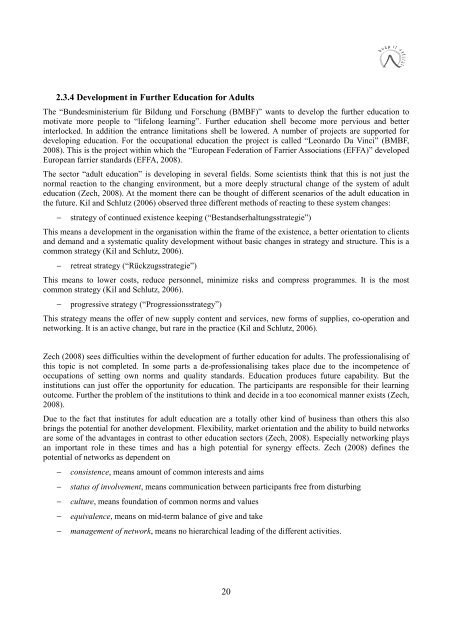Bachelor Thesis - Christina Kuenen - Hufpfleger
Bachelor Thesis - Christina Kuenen - Hufpfleger
Bachelor Thesis - Christina Kuenen - Hufpfleger
You also want an ePaper? Increase the reach of your titles
YUMPU automatically turns print PDFs into web optimized ePapers that Google loves.
2.3.4 Development in Further Education for Adults<br />
The “Bundesministerium für Bildung und Forschung (BMBF)” wants to develop the further education to<br />
motivate more people to “lifelong learning”. Further education shell become more pervious and better<br />
interlocked. In addition the entrance limitations shell be lowered. A number of projects are supported for<br />
developing education. For the occupational education the project is called “Leonardo Da Vinci” (BMBF,<br />
2008). This is the project within which the “European Federation of Farrier Associations (EFFA)” developed<br />
European farrier standards (EFFA, 2008).<br />
The sector “adult education” is developing in several fields. Some scientists think that this is not just the<br />
normal reaction to the changing environment, but a more deeply structural change of the system of adult<br />
education (Zech, 2008). At the moment there can be thought of different scenarios of the adult education in<br />
the future. Kil and Schlutz (2006) observed three different methods of reacting to these system changes:<br />
−<br />
strategy of continued existence keeping (“Bestandserhaltungsstrategie”)<br />
This means a development in the organisation within the frame of the existence, a better orientation to clients<br />
and demand and a systematic quality development without basic changes in strategy and structure. This is a<br />
common strategy (Kil and Schlutz, 2006).<br />
−<br />
retreat strategy (“Rückzugsstrategie”)<br />
This means to lower costs, reduce personnel, minimize risks and compress programmes. It is the most<br />
common strategy (Kil and Schlutz, 2006).<br />
−<br />
progressive strategy (“Progressionsstrategy”)<br />
This strategy means the offer of new supply content and services, new forms of supplies, co-operation and<br />
networking. It is an active change, but rare in the practice (Kil and Schlutz, 2006).<br />
Zech (2008) sees difficulties within the development of further education for adults. The professionalising of<br />
this topic is not completed. In some parts a de-professionalising takes place due to the incompetence of<br />
occupations of setting own norms and quality standards. Education produces future capability. But the<br />
institutions can just offer the opportunity for education. The participants are responsible for their learning<br />
outcome. Further the problem of the institutions to think and decide in a too economical manner exists (Zech,<br />
2008).<br />
Due to the fact that institutes for adult education are a totally other kind of business than others this also<br />
brings the potential for another development. Flexibility, market orientation and the ability to build networks<br />
are some of the advantages in contrast to other education sectors (Zech, 2008). Especially networking plays<br />
an important role in these times and has a high potential for synergy effects. Zech (2008) defines the<br />
potential of networks as dependent on<br />
−<br />
−<br />
−<br />
−<br />
−<br />
consistence, means amount of common interests and aims<br />
status of involvement, means communication between participants free from disturbing<br />
culture, means foundation of common norms and values<br />
equivalence, means on mid-term balance of give and take<br />
management of network, means no hierarchical leading of the different activities.<br />
20


